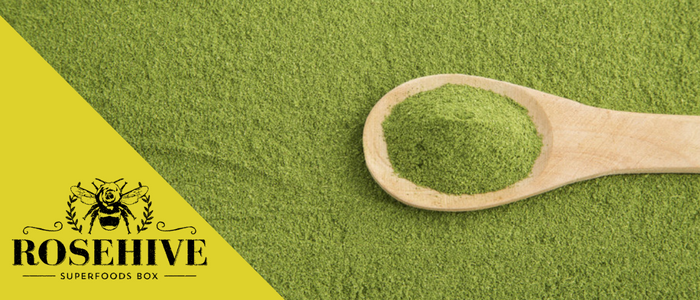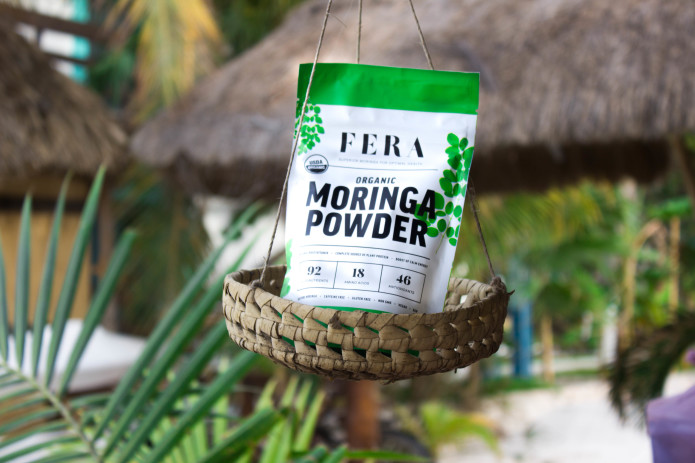
The Tree Of Life
Moringa oleifera is native to the Himalayas in northwestern India. Much of the plant is edible, and rich in vitamins A, B, and C, calcium, potassium, magnesium, iron, and….protein! In 2008 the National Institute of Health called moringa the “plant of the year,” acknowledging that “perhaps like no other single species, this plant has the potential to help reverse multiple major environmental problems and provide for many unmet human needs.” Moringa’s benefits have become highly touted in recent years and for good reason. Indigenous people have revered this sacred tree for its ability to provide us all major essential nutrients, being not only a stable food, it has been used as a daily multi-vitamin perhaps for centuries!
To put it into perspective, Moringa is said to have…
- 4 x the calcium of milk
- 4 x the vitamin A of carrots
- 2 x the protein of yogurt
- 3 x the potassium of bananas
- 7 x the vitamin C of oranges
- 3 x the iron in spinach
- Over 90 verifiable nutrients
- Packed with vitamins and minerals
- Rich in omega fatty acids 3, 6 and 9
- 46 antioxidants, 36 anti-inflammatory
Moringa has been used for centuries and known to help with sleep, anxiety, low energy, digestion skin disorders, and diabetes. In underdeveloped countries, moringa is used to counter malnutrition thanks to its potent nutritional value. For environmentalists, Moringa is one of the most sustainable plants to grow because the leaves and seeds can be harvested without damaging the trees themselves.
Check out our featured brand for April’s Plant-Based Protein Box…FERA Moringa sourced from a USDA organic farm in Ecuador!
The Healing Powers of Moringa
There are thousands of studies demonstrating on the benefits moringa has, especially, for those suffering with mineral or nutritional deficiency. Research shows that just about every part of the moringa plant can be utilized in some way, whether it’s to make a potent antioxidant tea or produce an oily substance that lubricates and nourishes the skin. Throughout the world, moringa is used for treating such widespread conditions as:
- inflammation-related diseases
- cancer
- diabetes
- anemia
- arthritis and other joint pain, such as rheumatism
- allergies and asthma
- constipation, stomach pains and and diarrhea
- epilepsy
- stomach and intestinal ulcers or spasms
- chronic headaches
- heart problems, including high blood pressure
- kidney stones
- fluid retention
- thyroid disorders
- low sex drive
- bacterial, fungal, viral and parasitic infections
6 Major Healing Qualities
This easy-to-grow tropical tree species, native to the Himalayan mountains and parts of India and Africa, comes packed with over “90 protective compounds, including isothiocyanates, flavonoids and phenolic acids.” Moringa has gained a reputation for fighting inflammation and combating various effects of malnutrition and aging, earning the nickname “the miracle plant.”
1. Is a powerful anti-inflammatory with a mega load of antioxidants.
One of the reasons that the many health benefits of herbal plants like Moringa oleifera are so impressive is because they contain similar abilities to conventional drugs, only of course it doesn’t pose the same level of risk or side effects. According to a report published in the Asian Pacific Journal of Cancer Prevention, moringa contains a mix of essential amino acids (the building blocks of proteins), carotenoid phytonutrients (the same kinds found in plants like carrots and tomatoes), antioxidants such as quercetin, and natural antibacterial compounds that work in the same way as many anti-inflammatory drugs.
2. Hormone Balance + slows the effects of aging
“A 2014 study published in the Journal of Food Science and Technology tested the effects of moringa along with amaranth leaves (Amaranthus tricolor) on levels of inflammation and oxidative stress in menopausal adult women. Knowing that levels of valuable antioxidant enzymes get affected during the postmenopausal period due to deficiency of “youthful” hormones, including estrogen, researchers wanted to investigate if these superfoods could help slow the effects of aging using natural herbal antioxidants that balance hormones naturally.”
Better fasting blood glucose control and positive increases in haemoglobin were also found, which led the researchers to conclude that these plants have therapeutic potential for helping to prevent complications due to aging and natural hormonal changes. Moringa benefits the libido as well and might work like a natural birth control compound, according to some studies.
3. Improves Digestive Health
“Due to its anti-inflammatory properties, moringa has been used in ancient systems of medicine such as Ayurveda to prevent or treat stomach ulcers, liver disease, kidney damage, fungal or yeast infections (such as candida), digestive complaints, and infections.”
4. Blood Sugar Balance > Helping Fight Diabetes
“Moringa contains a type of acid called chlorogenic acid, which has been shown to help control blood sugar levels and allow cells to take up or release glucose (sugar) as needed. This gives moringa natural antidiabetic and hormone-balancing properties. Aside from chloregnic acid, compounds called isothiocyanates that are present in moringa have also been tied to natural protection against diabetes.”
5. Protects and Nourishes the Skin
Moringa is an antibacterial, antifungal and antiviral known for its ability to protect the skin from various forms of infections. Some of the common ways it’s beenis used is reducing athlete’s foot, eliminating odors, reducing inflammation associated with acne breakouts, treating pockets of infection or abscesses, getting rid of dandruff, fighting gum disease, and helping heal bites, burns, viral warts and wounds.
6. Stabilizes Your Mood and Protects Your Brain
“As a high protein food and a rich source of the amino acid tryptophan, moringa benefits neurotransmitter functions, including those that produce the “feel good” hormone serotonin. Moringa is also rich in antioxidants and compounds that improve thyroid health, which makes it beneficial for maintaining high energy levels plus fighting fatigue, depression, low libido, moods swings and insomnia.
How To Use Moringa
There are a number of ways you can use moringa. Here are some of the most common uses for moringa…
In a Soup: Moringa’s active plant components don’t loose their effectiveness when Moringa is dried, ground or boiled – which makes it perfect to prepare into a soup.
As a tea: Letting dried Moringa leaves steep in hot water for a couple of minutes or so infuses the whole thing with its abundance of vitamins, minerals, amino acids and antioxidants among others. Apart from being a quick pick-me-up if you’re feeling a bit sluggish, Moringa tea also helps calm an upset stomach and relieves bloating.
In a smoothie: Mix with fresh juices or blend into smoothies – perfect to take when you’re on the go.
Topically: Moringa has anti-bacterial and anti-inflammatory properties and can be applied directly to the skin as a germ-killing astringent. Mix moringa powder with water to make a paste.
How do you like to enjoy Moringa? Let us know in the comments below!
Try our Moringa Guacamole recipe HERE.
![]()


